EFFECTS OF THE LAND USE OVER THE HEADWATER STREAMS ON THE CUIABÁ RIVER BASIN, MATO GROSSO
DOI:
https://doi.org/10.5902/2179460X9348Abstract
The headwaters streams are influenced by the terrestrial environment,which makes them vulnerable to human activities, especially in cerradoareas with intense changes caused by land use. The aim of this studywas to evaluate the effect of land use attributes on headwater streamsin the Rio Cuiabá basin, Mato Grosso. The 26 sampled streams werecharacterized from satellite images and measurements in situ. The attributesmeasured were type of land use in the watershed, dissolved oxygen,pH, temperature, turbidity, riparian width, average width, averagedepth, velocity and substrate type on the channel streams. The turbidityaffected negatively dissolved oxygen in headwater streams, as well asthe channel width positively affected water temperature and the riparianwidth positively affected leaves. Therefore, land use affected directlyand indirectly attributes of headwater streams in Cerrado.Downloads
Downloads
Published
How to Cite
Issue
Section
License
To access the DECLARATION AND TRANSFER OF COPYRIGHT AUTHOR’S DECLARATION AND COPYRIGHT LICENSE click here.
Ethical Guidelines for Journal Publication
The Ciência e Natura journal is committed to ensuring ethics in publication and quality of articles.
Conformance to standards of ethical behavior is therefore expected of all parties involved: Authors, Editors, Reviewers, and the Publisher.
In particular,
Authors: Authors should present an objective discussion of the significance of research work as well as sufficient detail and references to permit others to replicate the experiments. Fraudulent or knowingly inaccurate statements constitute unethical behavior and are unacceptable. Review Articles should also be objective, comprehensive, and accurate accounts of the state of the art. The Authors should ensure that their work is entirely original works, and if the work and/or words of others have been used, this has been appropriately acknowledged. Plagiarism in all its forms constitutes unethical publishing behavior and is unacceptable. Submitting the same manuscript to more than one journal concurrently constitutes unethical publishing behavior and is unacceptable. Authors should not submit articles describing essentially the same research to more than one journal. The corresponding Author should ensure that there is a full consensus of all Co-authors in approving the final version of the paper and its submission for publication.
Editors: Editors should evaluate manuscripts exclusively on the basis of their academic merit. An Editor must not use unpublished information in the editor's own research without the express written consent of the Author. Editors should take reasonable responsive measures when ethical complaints have been presented concerning a submitted manuscript or published paper.
Reviewers: Any manuscripts received for review must be treated as confidential documents. Privileged information or ideas obtained through peer review must be kept confidential and not used for personal advantage. Reviewers should be conducted objectively, and observations should be formulated clearly with supporting arguments, so that Authors can use them for improving the paper. Any selected Reviewer who feels unqualified to review the research reported in a manuscript or knows that its prompt review will be impossible should notify the Editor and excuse himself from the review process. Reviewers should not consider manuscripts in which they have conflicts of interest resulting from competitive, collaborative, or other relationships or connections with any of the authors, companies, or institutions connected to the papers.






